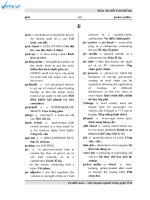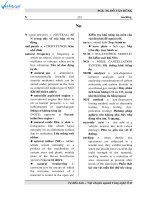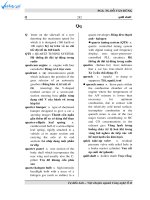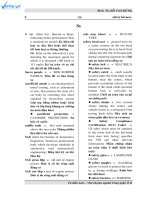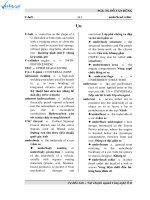Anh văn chuyên ngành công nghệ thực phẩm
Bạn đang xem bản rút gọn của tài liệu. Xem và tải ngay bản đầy đủ của tài liệu tại đây (1.66 MB, 15 trang )
LOGO
University of the commercial food industry
Ho Chi Minh city
Subject: English for food technology
Topics: The brewing process
Instructors:Duong Thi Bich Dao
Class: 02DHTP2
Group: 1
Ho Chi Minh city, may 6, 2013
ĐOÀN NGỌC TÂM THIỆN
ĐOÀN NGỌC TÂM THIỆN
NGUYỄN THỊ ÁI LY
NGUYỄN THỊ ÁI LY
PHAN THỊ NGỌC
PHAN THỊ NGỌC
BÙI THỊ ÁI HOÀNG
BÙI THỊ ÁI HỒNG
List of
members
NGUYỄN THỊ BÍCH HIỀN
NGUYỄN THỊ BÍCH HIỀN
ĐINH MINH SANG
ĐINH MINH SANG
TRƯƠNG QUỐC THỊNH
TRƯƠNG QUỐC THỊNH
NGUYỄN VIẾT TIẾN
NGUYỄN VIẾT TIẾN
ĐẶNG THỊ BÍCH TRÂM
ĐẶNG THỊ BÍCH TRÂM
In today’s mordern life, beer is
not a drink strange to us. It is
everywhere and everyone can use
regardless wealth. After you get
euphoria felling that they had
brought beer when you wonder
produced beer like???
Below is a brewing process
that the group we tried to
summarize you understand
The process of brewing beer is typically divided into
the following stages
Whirlpooling
Whirlpooling
Worting and hops
Worting and hops
adding
adding
Lautering
Lautering
Malting
Malting
Fermentating
Fermentating
Maturing
Maturing
Filtering
Filtering
Packaging
artwork
Barley grains are very rich in nutrients. They are classified in a certain size to ensure the
spent grains having the equal dimension. The grains with the width of 2.5mm and over are
selected.
First, the nutritional components such as starch and proteins are resolved. Barley which is
in the process of germination is also known as “Green Malt.”
The Green Malt contains many enzymes which are the extremely important factors in the
next stage. Then the Green Malt is dried with the hot air flow at about 80oC, this action
helps to control the proliferation of bacteria and to preserve Malt in good condition for a
long time.
Prior to boiling, the malt grains are milled into particles, this process improves the
efficiency of converting the starch in the grains into sugars (saccharification).
Step 1
Step 1
To resolve and break
the crystalised
structure of starch,
malt is put into the
boiling tank and
brought into boiling
water to convert into a
melted form. This
stage is called
“gelatinization”.
www.themegallery.com
Step 2
Step 2
Step 3
Step 3
At the end of
saccharification,
filtering is
performed to
remove solids
In addition,
malt grains
must be
classified to
ensure the
homogeneity
of size
Company Logo
Lautering
This is where the filter in the filtration process brewery
Worting
and
hops adding
The boiling of malt liquid and hops extract
components of hops that contribute bitterness
and aroma to the beer; it also prevents
microorganisms and enhances the retention
of beer froth.
The malt liquid reaches the proper
concentration.
The proteins are precipitated in the beer
liquid.
The residual enzymes in the malt liquid
are deactivated, and the malt liquid is
thoroughly sterilized.
Hops bitterness to help create beers
Whirlpooling
Whirlpooling
Filtered solids in
Filtered solids in
the fluid malt
the fluid malt
Malt is poured into this tank, as it spins the
centrifugal force collects the denser solids
into the center of the whirlpool.
Malt is cooled down to the
fermentation temperature and then is
provided with the necessary enzymes
for the growth of yeast
Yeast is put into the solution once
malt is cooled to the fermentation
temperature (8-10oC for bottomfermenting and 15-20oC for topfermenting) and enzyme is added.
Yeast then absorbs sugar and makes
sugar fermented. Under the impact of
enzyme fermentation, sugar
transforms into alcohol (methyl
alcohol) and CO2. The young beer is
formed a week later
www.themegallery.com
Company Logo
Maturing
3
2
1
Beer is
transferred to
the storage
tank, where it
is fermented
again
Company Logo
Young beer will
be transferred to
the maturing tank.
The fermentation
stage won’t be
completed until
approximately
85% amount of
sugar has
fermented
Frozen under 0oC,
it will be matured
for several weeks.
Young beer must
have fermentable
extracts and
remain a proper
amount of yeast to
ensure the next
fermenting stage
works efficiently
Filtering
Yeast and other dregs in
the maturing process will
be filtered
Packaging
Empty bottles
recovered
Cleaning and
disinfection
Filling and
bottling
In fact, in the brewing
process manufactures are
adding some additives such
as cooking process also
experiencing some small
stage. So that you
understand the group we’ve
picked out the most
important to introduce
-> thank you and you’re
listening
Company Logo
www.themegallery.com
LOGO
The end
Thank you!





